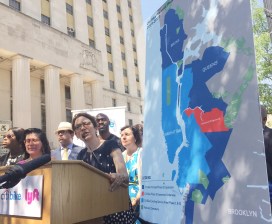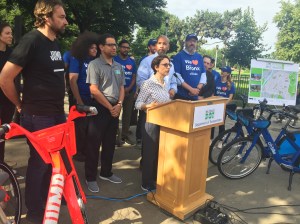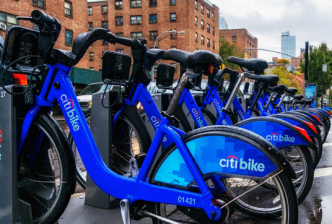NYC Subsidizes Lightly-Used Ferries. Why Not Hugely Popular Bike-Share?
The Wall Street Journal reports that Citi Bike is in the red, needing “tens of millions of dollars” to keep running.

The de Blasio administration hopes that private money will be found to rescue Alta Bicycle Share, the company that operates Citi Bike, which is the only large bike-share system in the country not to get public funds.
Other than user fees, the big chunk of revenue for Citi Bike comes from Citibank, which agreed to pay $41 million over a five-year sponsorship contract. MasterCard kicked in $6.5 million as well. It’s unclear how much of that $47.5 million is left. City Council Transportation Chair Ydanis Rodriguez intends to introduce legislation forcing Citi Bike to open its books, the Journal reports.
In order to get out of the hole, Alta says that it needs to attract more tourists and expand into new neighborhoods. It also wants to increase the program’s rates.
But a $95 annual membership is already a barrier for many New Yorkers. Even after offering $60 annual passes to NYCHA residents, only a few hundred of the system’s tens of thousands of annual members live in NYCHA housing.
Aside from the cost, Citi Bike stations are mostly in affluent neighborhoods. An expansion model that focuses only on attracting more tourists would mean coverage on the Upper East Side and Upper West Side, but no stations for Elmhurst, Corona, or Kingsbridge.
Alta is also seeking additional sponsorships. Some suggest that Citibank should step up its contribution. Arguably Citibank has already gotten sufficient return on its $41 million that it would not be unreasonable to ask for more. But the folks at Citibank may be less chummy with Mayor de Blasio than they were with finance industry veteran Bloomberg.
The Journal reports that Alta isn’t seeking city subsidies, but there is a case to be made for public dollars, especially if they are invested in ways to make the program accessible to more communities.
After all, the city subsidizes the East River Ferry, which averages 3,200 daily riders, but not Citi Bike, which was averaging 35,000 daily riders in November and consistently exceeded 10,000 daily rides in the winter. The approximately $2.5 million that goes to ferries could benefit more people if it was spent to bolster Citi Bike and expand it into working class neighborhoods.
But that likely won’t be enough to expand into lower-income areas, which would also mean working to keep annual membership costs low.
The de Blasio administration must work to solidify the bike-share system and push Alta to serve a more diverse demographic. Citi Bike’s sponsorship is only five years long, and the city must be prepared for any eventuality.
Perhaps public funds are in order. It’s a discussion worth having.
Otherwise, de Blasio could ask Mike Bloomberg if he wouldn’t mind cutting a check. Then we can all ride around on BloomieBikes.



